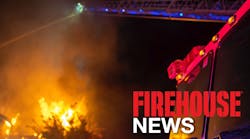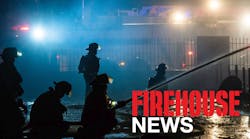That was the lesson learned in Mesa, AZ, where the fire department introduced an ordinance requiring sprinklers in all new commercial and residential buildings, including private homes. From the start, the department had the support of the mayor, the city manager, the majority of the city council and one of Mesa's two newspapers. The council passed the bill last October and it was to take effect within six months. The Mesa Fire Department, led by Chief Dennis Compton , rightfully thought they had won a major victory in the war to save lives and property.
But the builders and realtors, who opposed the code, struck back by collecting thousands of signatures and forcing the sprinkler law to be submitted to a referendum before it could take effect. Their trade associations mounted a well-financed and high-powered campaign that rehashed all of the myths, lies and misinformation that surrounds sprinklers.
They also invented a few new ones and used the news media, road signs, phone banks and advertising to convince voters that sprinklers are ugly, unreliable and cause massive damage when a malfunction occurs. They charged that sprinklers are an expensive luxury that would drive up the cost of homes and make them unaffordable for the average family. Another attack claimed that fire inspectors - dubbed the "sprinkler police" - would invade the privacy of your home. One of their most effective ploys pushed the idea that government was becoming too intrusive. "If the government can put sprinklers in your house, who knows what's next?" an anti-sprinkler spokesman warned on television.
Because it had become a referendum and a political issue, the city attorney ruled that the fire department could not be involved in the fight to save its own ordinance; firefighters had to stand silently on the sidelines. However, a citizens committee in favor of sprinklers launched its own campaign to counter the propaganda being put out by the builders and realtors. But, as Chief Compton explains, "They had to do two or three years of public education in just four months."
That campaign failed and the voters overwhelmingly rejected the sprinkler law by a two-to-one margin in the March referendum. What had been a victory for fire safety turned into a defeat.
But it was only a temporary setback because the Mesa Fire Department refused to give up. They met with the opposition and drafted a new code requiring sprinklers in new commercial buildings and multi-family and duplex apartment houses. Single-family homes were excluded, but builders would be required to offer the option of installing sprinklers and home buyers would have to sign an affidavit stating that they had been offered the option and received the fire department's information on sprinklers. All sides agreed, the council passed it and the revised code became law.
Many in the fire service would question the decision to make sprinklers an option in private homes, but Compton points out that they had to compromise or there would be no law at all. "The test will come when we see how many buyers accept the sprinkler option and how many installations we end up with," Compton says. "We're going to make it work and we're going to be in the business of public education on home fire sprinklers forever."
Mesa is a fast-growing city of more than 400,000, which is expected to double its population in the next 10 years. The sprinklers are going to protect a lot of new construction and the city council gave the fire department the money for two added positions for public education specialists, who will spread the sprinkler gospel. But that's not enough and Compton believes that the fire service and the sprinkler industry have to be more aggressive in marketing fire safety.
The Mesa experience illustrates how ignorant the public and the news media are when it comes to sprinklers and how easy it is for opponents to exploit that ignorance. People have seen too many movies and television programs in which the slightest bump or wisp of cigar smoke sets off an entire sprinkler system, dousing everyone and everything in a torrent of water. I call it the "Three Stooges mentality" and it's supposed to be funny, but it's pure fantasy.
That's why the first step for any fire department contemplating a new or stronger sprinkler law is a public education campaign to sell the case for sprinklers. It is especially crucial to educate the news media and get them on your side because the battle will be fought on television and in the newspapers. The National Fire Protection Association's "Home Fire Sprinkler Coalition" and the National Fire Sprinkler Association can supply the ammunition you need to defend against a very determined opposition.
Obviously, a fire department must have an effective public information program in place before you start. You can't hope to win without it. Chief officers and public information officers have to speak out and publicize every working fire to show how sprinklers would have made a difference. And, make sure the media know about those minor incidents in which fire companies simply mopped up some water because one or two sprinkler heads did their job of saving lives and property.
At the same time, you have to line up the political support that's needed to pass the ordinance, starting with the top elected officials and the city or county council. You also can't win if you don't have the votes.
Finally, be prepared for the sneak attack that will come just when you think you've won. The people who build, sell, own and operate the buildings earn huge profits and know how to use their money and political clout to exploit the "Three Stooges mentality." We've learned from experience that they always have one more trick up their sleeves. Don't let them do it. Always keep your guard up.
Hal Bruno, a Firehouse® contributing editor, is a retired political director for ABC News in Washington and served almost 40 years as a volunteer firefighter. He is a director of the Chevy Chase, MD, Fire Department and chairman of the National Fallen Firefighters Foundation.




